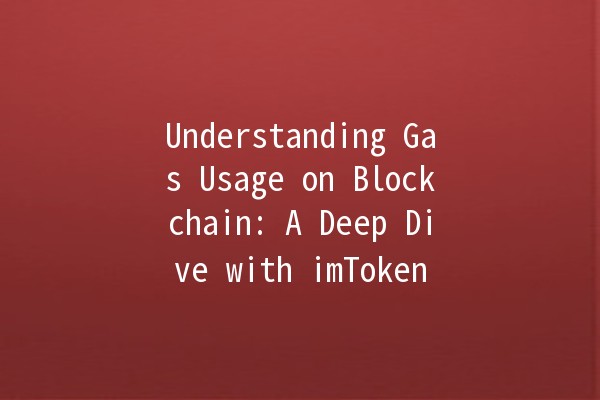Gas fees are a critical part of engaging with blockchain networks, especially for users of popular wallets like imToken. Knowing how to effectively manage and query gas usage can significantly enhance your transaction experience on the Ethereum blockchain and beyond. In this article, we’ll explore practical tips, productivityenhancing strategies, and common challenges surrounding gas usage, particularly when using the imToken wallet.
Gas refers to the unit of measurement for the computational work required to execute operations on the Ethereum blockchain. Every transaction or contract execution requires a certain amount of gas, which is paid for in Ether (ETH). Understanding gas is essential for anyone participating in the cryptocurrency economy, as it can influence the cost and speed of transactions.
Key Points:
Gas prices fluctuate based on network demand.
Higher gas prices generally lead to faster transaction confirmations.

Tracking gas usage can help avoid overpaying or experiencing delays.
The imToken wallet allows users to easily query current gas prices. It provides realtime data to help you choose the appropriate gas price for your transactions.
If you see a spike in gas prices, you can decide whether to delay your transaction until prices drop, ensuring you save on fees.
Gas estimation is a feature that helps users predict the gas required for a particular transaction. This estimation helps you avoid failures due to insufficient gas limits.
Simulate Transactions: Before executing, use the imToken wallet's transaction simulation tool to check the estimated gas required.
Set Limits: Manually set the gas limit based on the estimation to reduce the risk of 'out of gas' errors.
When sending tokens, the wallet might estimate that 21,000 gas units are needed. Confirming this helps ensure that your transaction will succeed without unnecessary fees.
Gas tokens are a way for users to reduce their gas costs, especially during times of high network congestion. They allow you to "store" gas when prices are low and "redeem" it when prices are high.
Buy Gas Tokens: Purchase gas tokens when the price is low.
Redeem During Transactions: Use these tokens to cover your gas fees when prices rise.
This strategy is particularly effective for regular traders who want to mitigate the impact of fluctuating gas prices on their transaction costs.
Keeping an eye on gas price trends can empower users to make informed decisions about their transactions. ImToken provides analytics tools for users to monitor these trends over time.
Use Analytics Tools: Access builtin analytics in the imToken app to evaluate historic gas prices.
Analyze Historical Data: Identify patterns in gas prices and network congestion.
If you observe that gas prices consistently drop during certain hours of the day, you can sync your transactions to those times.
Setting up alerts for gas prices can help you stay informed without having to constantly check the app. This proactive approach can save you both time and money.
Navigate to Settings: d the alerts or notifications section in the imToken app.
Configure Gas Price Alerts: Set your preferred threshold for gas prices.
If you know that you prefer to transact only when gas prices are below a specific level, alerts will notify you when the conditions are favorable.
Here are some common questions regarding gas usage and implications when using imToken:
Underestimating gas can lead to transaction failure. The transaction will not process until you increase the gas limit or price.
Set a higher gas price during peak hours or use imToken’s network statistics to select optimal conditions.
Yes, the imToken wallet provides transaction history, where you can review past gas usage for your transactions.
If a transaction gets stuck, you can either wait for it to be confirmed or manually cancel it if possible.
No, gas fees vary by network. Ethereum often has higher fees compared to other blockchains.
Yes, you can set a maximum fee you’re willing to pay, helping manage costs effectively.
Mastering gas usage offers users numerous advantages:
Cost Savings: By effectively managing gas fees, users can save money on transactions.
Transaction Efficiency: Understanding when to transact based on gas prices boosts overall efficiency.
Enhanced DecisionMaking: Equipped with proper knowledge, users can make informed decisions about their crypto transactions.
Incorporating these techniques into your imToken usage will not only help you navigate gas fees efficiently but also contribute to enhanced productivity and costeffectiveness in managing your cryptocurrency transactions. By leveraging the tools and strategies outlined here, you’ll take your blockchain experience to the next level!